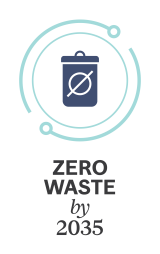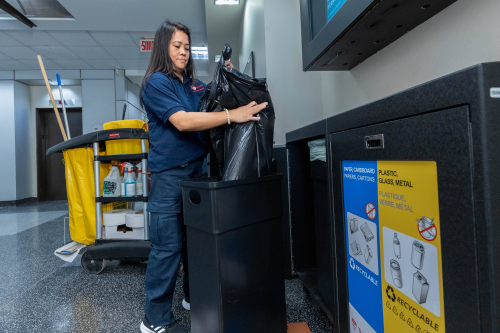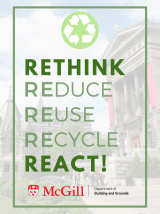FMAS ensures a clean and functional environment for the community, collecting on average 70 tonnes of waste per month during the academic year – an amount it aims to drastically reduce.
Zero Waste by 2035 
McGill has set a goal of achieving zero waste by 2035. As per the internationally recognized standard, zero waste means achieving a diversion rate of 90% or higher.
In 2020, our diversion rate was 45.1%, up 7.5 percentage points from the year before, and we are taking steps to further increase this rate and get closer to the zero-waste target.
Strategy
McGill’s waste reduction and diversion strategy 2018 – 2025 sets out the University’s vision for our waste management. FMAS plays an essential role in implementing many of the key initiatives of the strategy.
 Standardized sorting stations
Standardized sorting stations
Outfitting major buildings on campus with multiple-stream sorting stations is one of the initiatives aimed at helping McGill achieve its zero-waste goal. FMAS installed over 475 of them in 2021 alone.
We are now working toward removing stand-alone trash bins outdoors and installing combined waste and recycling bins.
Rethink React
As part of the waste reduction and diversion strategy 2018 – 2025, FMAS introduced the Rethink React engagement and education campaign. The campaign’s goal is to improve McGill’s diversion rate by encouraging the McGill community to think and act differently about how we create and sort waste. This includes the way we buy, reuse, recycle and dispose of materials throughout the University.
How to sort
Landfills are a major contributor to climate change. Not only do they increase the risk of soil, water and air pollution, but they also release a mixture of greenhouse gases such as methane.
We encourage the McGill community to avoid landfilling by rethinking the way we consume and reacting by always following the waste hierarchy before throwing something away.
At McGill, non-hazardous waste is sorted in four streams: compost, paper, mixed recycling, and landfill. See our guide on how to sort your waste for the details.
Paper and cardboard are separate from other recyclables to ensure that any food or drink left on recycled containers do not contaminate clean paper.
Composting
Organic waste collection at the Macdonald campus began in 2013 in collaboration with the City of Sainte-Anne-de-Bellevue. On the downtown campus, collection began in 27 academic buildings at the end of 2021. With the expansion of composting downtown, the University is expected to recover at least an additional 100 tonnes of organic waste, equivalent to the weight of approximately 17 elephants.
FMAS also offers composting services for outdoor events where food is served. Since water bottles have been banned on McGill campuses since 2019, FMAS stores, maintains and makes available water bottle filling stations to event organizers as part of its Events Support services.
Recycling & Reusing
Reusing items at McGill
As part of McGill’s Zero Waste goal, we aim to increase the reuse of materials before sorting them for recycling or landfill. Below are current options for reusing items at McGill.
- Clean ice packs from laboratories
Ice packs often accompany incoming shipments of lab supplies. They are not recyclable, but non-hazardous ice packs can be reused several times.
To donate used non-hazardous ice packs for reuse, take clean dry ice packs to one of the following five locations and upload your donation via this form: https://mcgill.ca/x/wuK
To request used ice packs and schedule a pickup visit the Zupply platform https://app.zupply.site/login. To create a Zupply account, please send a request to the following email "email address".
NOTE:
- Ice packs are collected for reuse at the following five locations.
- Only non-hazardous ice packs will be accepted. No residues of WHMIS controlled substances or potentially infectious material are allowed.
- Lab users are responsible for collecting, and depositing CLEAN, DRY icepacks in the designated bins at the five locations.
- Icepack donations MUST be recorded in this form so that it can be tracked and flagged as available for pickup.
| Ice pack donation / collection site | Buildings served |
|---|---|
| 1) McIntyre Medical Sciences Building loading dock | McIntyre Medical Sciences Building, Stewart Biological Sciences Building, Bellini, Cancer Research Pavilion, Goodman Cancer Research Building (5) |
| 2) Wong building loading dock | Genome / Penfield 740, Wong, Strathcona Anatomy & Dentistry Building, Lyman Duff (5) |
| 3) Pulp and Paper loading dock | Otto Maass Chemistry Building, Pulp & Paper (2) |
| 4) Montreal Neurological Institute | Montreal Neurological Institute (1) |
| 5) Macdonald-Stewart Building loading dock | Macdonald-Stewart Building, Parasitology, Barton, Raymond (4) |
2. Residential and household items: Take items to Thrift McGill https://www.mcgill.ca/shhs/thrift-mcgill
McGill Thrift is a donation-based thrift store serving students and staff. It aims to reduce waste by collecting items from student and staff that they no longer have use for. All items are available for FREE with a valid McGill ID card.
3. Construction materials, furniture, appliances and miscellaneous items*: Upload items to Zupply platform https://app.zupply.site/login
To create a Zupply account, please send a request to the following email "email address".
*NOTE: The reuse of furniture and appliances must follow McGill’s Furniture and Appliances Asset Management Procedures (https://www.mcgill.ca/procurement/programs/asset-management/asset-purposes-categories )
Equipment, supplies, electronics, and batteries
In addition to the multi-stream sorting stations and composting initiatives, FMAS has implemented recycling programs for equipment and supplies wherever possible.
Examples include:
- Recycling of batteries, old electronic equipment, computers and metal appliances.
- Recycling of industrial batteries from floor-scrubbing machines.
- Use of recyclable floor brushes as opposed to disposable pads.
- Preventative equipment maintenance program in which the parts still usable from all dysfunctional machines are kept and reused.
- Recycling fluorescent lights.
- Recycling waste paint, oil and toner cartridges.
Special battery collection bins are offered in the lobbies of most major buildings on campus. See the list of battery bin locations.
Small electronics can also be recycled by leaving them in the Electrobac bin in the lobby of 680 Sherbrooke W. Following collection, the items are recycled or refurbished responsibly, following environmental best practices.
Construction
Construction waste is one of the biggest waste streams at McGill, given our high volume of renovation projects. Although technically not included in the zero-waste target, McGill is making significant progress in reducing and repurposing construction materials, in collaboration with our contractors and suppliers. All project teams must submit a waste management and disposal plan.
Our goal is to increase the percentage of materials that is reused before sending it to a waste-sorting facility. We are implementing this through improved asset management within the University (repurposing of furniture, for example) and by collaborating with external partners such as non-profit organizations and companies.
For example, at the New Vic project, the construction teams are tasked with meeting McGill’s standard of recycling 75 percent of uncontaminated demolition materials. Wherever feasible, excavation materials will also be recycled with salvaged limestone being incorporated into new facades. In addition, we are collaborating with external parties interested in reusing doors, hardware, lighting fixtures, plumbing fixtures, washroom grab bars and paper towel dispensers.
